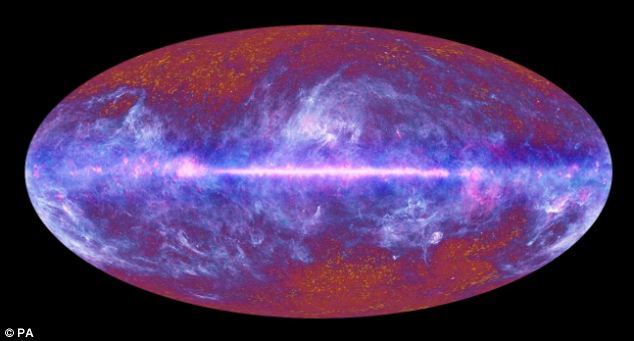.
Astronomers are expected to announce they have found 'primordial gravitational waves' - an echo of the big bang in which the universe came into existence 14bn years ago.
Described as 'like a message from the dawn of time', if confirmed it it would be a groundbreaking discovery that would change the face of physics and give scientists their first glimpse of how the universe was born.
Gravitational waves, the last untested prediction of Albert Einstein’s General Theory of Relativity, are minuscule ripples in the fabric of the universe that carry energy across space - rather like the waves than travel across an ocean.
.

Microwave radiation from the whole sky, captured by the European Space Agency's Planck satellite. Astronomers are on Monday expected to announce they have found 'primordial gravitational waves' ¿ an echo of the big bang in which the universe came into existence 14bn years ago.
.
The signal is rumoured to have been found by a specialised telescope called Bicep (Background Imaging of Cosmic Extragalactic Polarization) at the south pole.
It scans the sky at microwave frequencies, where it picks up the fossil energy from the big bang.
The team of scientists have only said they will unveil a 'major discovery' in the field of astrophysics on Monday (March 17) in a presentation at the Harvard-Smithsonian Center for Astrophysics (CfA).
According to theory, the primordial gravitational waves will tell us about the first, moment of the universe’s history.
Cosmologists believe that 10-34 seconds after the big bang (a decimal point followed by 33 zeros and a one) the universe was driven to expand hugely.
Known as inflation, the theory is used to explain why the universe is uniform from place to place.
However, astronomers have never been able to explain how it happened.
Experts say convincing evidence of their discovery would almost certainly lead to a Nobel prize.
.

The 14-billion-year-long history of our universe. It shows the main events that occurred between the initial phase of the cosmos -- where its properties were almost uniform and punctuated only by tiny fluctuations -- to the rich variety of cosmic structure that we observe today, ranging from stars and planets to galaxies and galaxy clusters.
.
'If they do announce primordial gravitational waves on Monday, I will take a huge amount of convincing,' said Hiranya Peiris, a cosmologist from University College London told The Guardian.
'But if they do have a robust detection … Jesus, wow! I’ll be taking next week off.'
CfA officials have refused to speculate on the announcement.
They only stated that the center will 'host a press conference at 12:00 noon EDT (16:00 UTC) on Monday, March 17th, to announce a major discovery.'
The Harvard-Smithsonian Center for Astrophysics is made up of the Harvard College Observatory and the Smithsonian Astrophysics Observatory. Scientists at the center pursue studies of those basic physical process that determine the nature and evolution of the universe," according to the CfA website's official description.
Quelle: MailOnline
